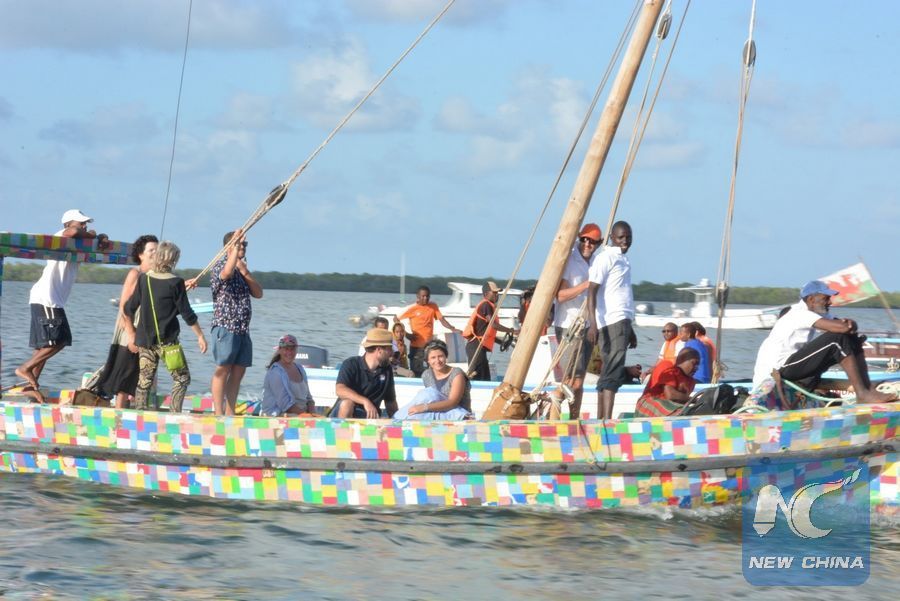
File photo shows revellers ride in a newly launched world first 100% recycled plastic sail boat in Lamu County, Kenya, Sept. 15, 2018. (Xinhua/Charles Onyango)
NAIROBI, Jan. 14 (Xinhua) -- A traditional dhow sailing boat made entirely from plastic trash collected from Kenya's beaches and towns will make its maiden voyage across the East African Coast later this month.
The boat that will make a 500-kilometer expedition from Lamu town in Kenya to Zanzibar in Tanzania will be making stops along the beaches on the way to help change mindsets of people on plastic management.
"The boat that is nicknamed "Flipflopi" is a reminder of the urgent need for us to rethink the way we manufacture, use and manage single-use plastic," Joyce Msuya, UN Environment's Acting Executive Director, said in a statement on Friday.
She revealed that the boat will make six stops along the East African coastline to inspire communities on how to repurpose their own plastic waste, and promote UN Environment Clean Seas Campaign.
Msuya noted that expedition inspires communities living along Africa's coastline and beyond to look at plastic waste not as trash but as a resource that can be collected and used productively.
Msuya noted that the "Flipflopi" is a first-of-its-kind, nine-metre sailing boat made from 10 tons of discarded plastic.
She said that the boat has been built by a team calling for a plastic revolution to stem the flow of up to 12 million tons of plastic waste dumped into the world's oceans each year and to highlight the potential for plastic waste to be re-used.
The expedition will start in Lamu on Jan. 24 and arrive in Stone Town in Zanzibar on Feb. 7, where the Flipflopi and Clean seas teams will meet up with Conservation Music at the Busara Music Festival, engaging festival goers in the fight against marine plastic pollution through performing arts.
She noted that in Africa, marine debris represents a potential threat to food security, economic development, and the viability of the marine ecosystems.
"With over 12 million people on the continent engaged in fisheries, their livelihood is directly affected by marine pollution, and the proportion of protein intake from fish is high across Africa," said Msuya.
The dhow was launched in late 2018 in Lamu and has now partnered with UN Environment's Clean Seas campaign, which engages governments, the public and the private sector in the fight against marine plastic pollution.
Nine African countries have already signed onto the campaign, promising to take action to tackle marine pollution.
The launch is taking place nearly two years after Kenya introduced the world's toughest laws on single-use plastic bags and it is set to play a bigger role in engaging the public in thinking about plastic differently.
According to the UN Environment, 127 out of 192 countries have reviewed while some have adopted some form of legislation to regulate plastic bags and that 27 countries have enacted legislation banning specific products (plates, cups, straws, packaging), materials (polystyrene) or production levels.

